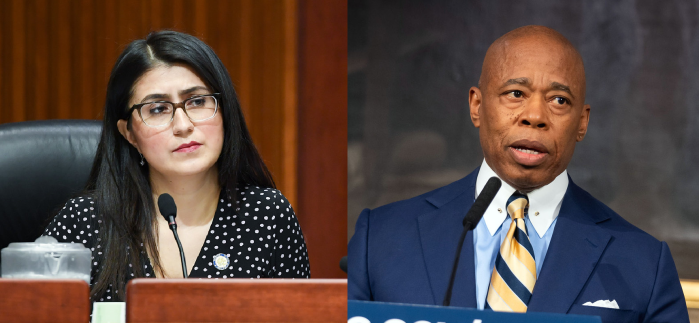By Craig Giammona
He suffered for close to two years in the hospital, often hovering between life and death. When he was cognizant, McDonald questioned whether he wanted to be alive. He needed several operations, including a tracheotomy to breathe. He knew he would likely be confined to a wheelchair for the rest of his life.Still, McDonald found it in his heart to forgive the 15-year old Harlem boy who shot him at close range and now tells his story as a means of encouraging students to resolve disputes peacefully and reject violence. On Friday, he spoke at New Preparatory Middle School 8 on 167th Street, telling a gymnasium packed with 650 seventh- and eighth-graders from Jamaica that it takes much more courage to forgive than it does to use violence. McDonald, in fact, told the students that he would not be alive today had he not found the strength to forgive Shavod Jones, the assailant who changed his life forever in 1986.”If I held onto the anger it would have taken my life, sooner or later,” McDonald said, speaking from a stage adorned with portraits of Dr. Martin Luther King Jr., Robert Kennedy, Ghandi and Father Mychal Judge, a chaplain with the city Fire Department who was killed on Sept. 11 after rushing to the World Trade Center. “You're not here to hurt each other, you have to help each other.”McDonald was a young cop patrolling Central Park in plainclothes on July 12, 1986. His wife was three months pregnant. There had been a rash of bicycle thefts and other petty crimes in the park that summer, largely, the police believed, committed by teenagers. That day, McDonald and his partner spotted three young suspects, ages 13, 14 and 15, whom they believed were acting suspiciously. The teens recognized them as cops and a chase ensued. While questioning the boys, McDonald spotted a bulge in the sock of the youngest suspect. Believing it was a gun, he knelt down to touch it. The next thing he knew, the 15-year-old was pointing a gun at his head. A second later, the muzzle exploded, lodging a bullet behind McDonald's right eye. As he fell, the assailant shot him again in the throat and then a third time as he lay bleeding on the ground.”In a second, I went from an active New York City police officer to a crime statistic,” McDonald said Friday.McDonald's story is detailed in the book “Why Forgive,” by Johann Christoph Arnold, who usually accompanies McDonald on speaking engagements. The book, which includes several stories of tragedy and forgiveness, was distributed to each student at the event. Arnold was sick Friday and could not attend the assembly, but McDonald, who spoke in a clear voice that demanded the attention of the students, was clearly capable of carrying the duo's message to the students. McDonald stressed that they must take charge of their lives and make responsible choices.”God made you to do great things in your life,” McDonald said, “You have to believe that.”The students, who sat quietly for most of the speech, gasped when the detective revealed another twist in his story. McDonald and Jones became friends and corresponded frequently while Jones served his nine-year prison sentence. Three days after being released, however, Jones was killed in a motorcycle accident.McDonald used the anecdote to drive home his overriding message: Life is too short to hold grudges, or live with hatred.Reach Reporter Craig Giammona by email at news@timesledger.com or by phone at 718-229-0300 ext. 146.

































